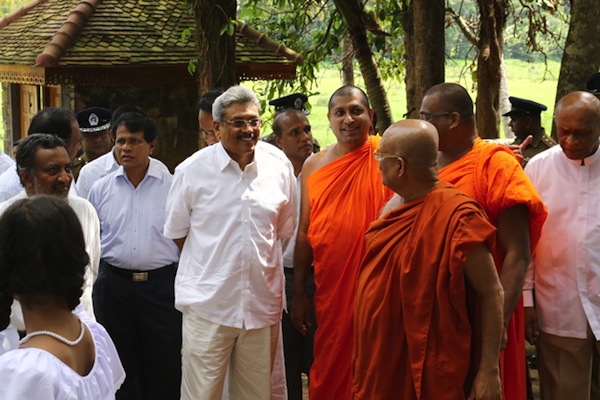Image via DBS Jeyaraj.com
My faith is not threatened by the faith of others whose beliefs are different from my own. Neither my race nor my culture is under threat of being engulfed by another. I am now a migrant and a traveller. My land is no longer confined by any arbitrarily drawn state or national border. I am a custodian of the whole Earth and a brother to all of humanity. Yet, as I sit to pen these thoughts, 8,335 km away from home, I realise how difficult it is to draw conclusions about how widespread the religious intolerance in Sri Lanka is and whether it is as pronounced in society as it is in social media. I do not have a feel for whether it is growing or subsiding and by how much. What I am certain though, is that no priest or politician, not even beloved relative or dear friend can usurp my right and obligation to speak for myself.
I also know – you tend to learn these things tangibly, when you travel across different cultures and beliefs, various shades of skin colour and strange words – that hatred and intolerance, fear and insecurity are not malignancies that are unique to Sri Lanka. I have found it verifiably true, that for every bigot who seeks to incite hatred, there are many patriots we can rally together with – who will unite us. For every coward who seeks to make us fearful of pluralism, we can choose to embrace the diversity around us and be enriched by it. For every political opportunist who seeks to turn us against our own, we can reach out to discover ourselves in others and them in us.
Those of purer intentions and unprejudiced judgement have painstakingly pointed out the real dangers that lurk behind the cacophony of hate speech and intolerance, that could plunge our tiny nation back into the hellfires of war. Some strategists have even gone to the extent of warning that any unfair treatment of Muslims could attract radicalised groups from all over the world, as has happened in Afghanistan and Iraq over the last decade at a time when those wars are drawing to a close. Such arguments have merit.
However, history, as well as life experience demonstrate that what we need to resolve in post-war Sri Lanka today, are not merely questions of racial or religious tolerance – if not equality. Nor are they exclusively problems about sustaining the hard won peace or avoiding another debilitating war. It matters even less to me personally, what one radicalised group or another does or fails to do to antagonise a community of fellow citizens.
If we were to distill all the problems and challenges facing our nation and the rest of the world (and indeed much of civilisation itself) the issue to be resolved is primarily a question about justice. It is a question that has persisted through history – both locally and internationally. The undisputed heroes of history have been those who served the interests of justice – from Elara’s judgements, to Martin Luther King Jnr. and Mahatma Gandhi’s activism as well as Nelson Mandela’s resistance. Justice is not synonymous with equality or the rule of law – but people who respect each other and treat others as equals living in a society that is governed by good laws is one that serves the interests of justice.
The memory of our country being stripped of its dignity by colonial powers and denied justice for centuries is still very much alive in our social conscience. It must be a cause of greater shame then; that have been persecuting each other since gaining independence. It may have been the Tamils who have suffered most conspicuously in recent history, Muslims every now and then for at least a century since the riots of 1915, Christian churches have been burned down every once in awhile… and Buddhists too; when religion is not an excuse, we withhold justice from each other based on caste differences; when race is not an excuse, then we denigrate each other by place of birth, ancestry or lineage. If nothing else, by political affiliation, social status, proximity to power and even by which school we studied at.
Therefore, what we must collectively resist are the actions and beliefs that come into conflict against the interests of justice. We either live in a just society or we don’t. There is nothing in between. A country that does not afford justice to one individual, is structurally incapable of affording justice to any other individual or a group. But we live in a flawed world and therefore the pursuit of justice will always remain a struggle. That is why, an unjust society is not merely one where an individual or group is vulnerable to marginalization and persecution – regardless of whether they are Buddhists, Muslims or hapless Samurdhi officials who fail to attend meetings – but one where the rest of society is complicit in their silence and inaction in the face of prevailing injustices.
That is why neither those who speak for justice or those who stand in its way can speak for me. It is therefore imperative that I must take a stand on whichever side i choose. Because to remain silent is not only a betrayal of the interests of justice or a letdown of all victims of injustice – but it allows others to usurp the space left vacant and to occupy my place in history that I – in my silence – have left empty and unfulfilled.
